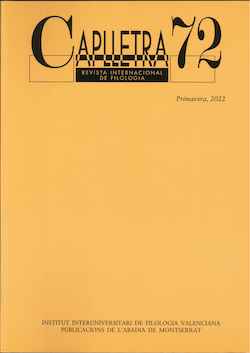«Ars orandi»: Ramon Llull’s «Ars compendiosa Dei»
DOI:
https://doi.org/10.7203/caplletra.72.22969Keywords:
Prayer, Logic, Rhetoric, (Divine) Justice and Mercy, Antithesis Abstract
Abstract
Using Barbara H. Jaye’s brief survey of the artes orandi as a starting point, I examine Ramon Llull’s Ars compendiosa Dei (May 1308) in the light of the definition she provides of the genre. Though I do not share Jaye’s belief that the ACD is the sole text within Llull’s corpus which might qualify as such an ars, I nevertheless carry out a kind of «thought experiment» on the basis of her insights. I incorporate into my own account consideration of certain Aristotelian logical constructs (e.g. theories of antithesis) to show how these (and other) determinants interact with Christian beliefs in their explication of the relations holding between divine mercy and justice and their human counterparts. Penitent humanity finds itself situated within precisely such a network of relations in respect of a just and merciful God. At the heart of this relationship lies the bidirectional discourse between God and humanity, articulated primordially in the former’s address to the latter and subsequently in the latter’s response as orant-contemplative.
 Downloads
Downloads
Downloads
Published
How to Cite
-
Abstract352
-
PDF469
Issue
Section
License
Authors submitting work to Caplletra for publication must be the legitimate holder of the usage rights. Legitimacy for the purposes of publishing the work must also include images, tables, diagrams and any other materials that may complement the text, whether they are the author of such material or not.
Copyright: on publishing their work in the journal, the author grants Caplletra. Revista Internacional de Filologia usage rights (reproduction, distribution and public communication) for both the paper printed version and for the electronic version.
All work published in Caplletra is covered by the Creative Commons license type Attribution-NonCommercial-NoDerivatives 4.0 (CC BY-NC-ND 4.0).
RESPONSABILITY
Caplletra. Revista Internacional de Filologia does not necessarily identify with the points of view expressed in the papers it publishes.
Caplletra. Revista Internacional de Filologia accepts no responsibility whatsoever for any eventual infringement of intellectual property rights on the part of authors.






